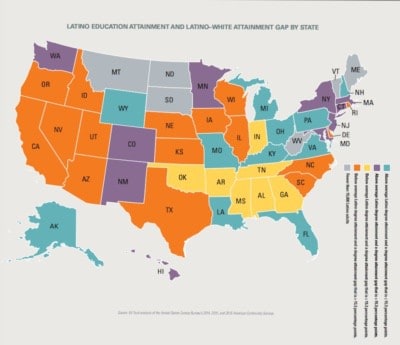Grow Great NC, Inc., a new group focused on education reform, kicked off its first official day as an organization yesterday by bringing former Florida governor and presidential candidate Jeb Bush to town. Bush took part in a question and answer session with state Superintendent Mark Johnson at the City Club in downtown Raleigh, and spent much of the time highlighting his state’s educational achievements and congratulating North Carolina leaders on taking Florida’s lead.
“There are 50 state Senate presidents in the country,” Bush said to Senate President Pro Tempore Phil Berger, R-Rockingham, after the senator introduced him. “I can’t think of one who has done more for education reform than you.”
Berger, for his part, said when Republicans came into power, Bush’s example was one that legislative leaders looked to.
“We knew that we had to look to other states, particularly other states that had bridged some of the gaps that we had in North Carolina,” Berger said. “At that time there was no better example in the United States than the state of Florida under the leadership of Governor Jeb Bush.”
In a wide-ranging discussion, Johnson and Bush talked about everything from school choice to Bush’s role in transforming Florida’s educational landscape.
Bush pointed to policies such as school performance grades, a focus on reading, incentives for effective teachers, and school choice, as some of the key drivers of change in Florida.
“The net effect of this is we have rising student achievement…and now North Carolina and Florida are on the vanguard of many of these reforms,” he said.
North Carolina has followed in the steps of some of Florida’s reforms, not only by increasing school choice, but also through adopting school performance grades, implementing Read to Achieve, and emphasizing rewards for teachers who show achievement gains in the classroom.
In light of recent high-profile teacher rallies — including in North Carolina, where thousands of teachers descended on Raleigh to ask for more salary and resources — Johnson asked Bush how he conveyed reform efforts to educators in Florida, especially when there are groups that Johnson said claim to represent all teachers.
In response, Bush criticized unions and said they represent public employees in school districts, not just teachers.
“This is about the political power of a union that uses their dues to be able to carry out a political agenda that goes way beyond teaching,” he said. “It gets into the areas of foreign policy at the national level. Funding of Planned Parenthood…that should not be the mission of a teacher’s union.”
North Carolina has no teacher’s union, but the North Carolina Association of Educators is heavily involved in advocating for teachers and helped organize the recent rally. Its actions are sometimes painted by opponents as being similar to those of a union.
When it comes to school choice, Bush said that charters and opportunity scholarships are so entrenched in Florida’s educational system that they have powerful constituencies who would bristle at having what they perceive as a right taken away from them.
“You build a constituency and they can’t take it away,” he said. He also said that choice advocates need to be making the case that options like opportunity scholarships actually save money for traditional public schools because the amount of money students get for the scholarships is less than the per-pupil cost of educating them in district schools.
Bush also challenged the broader narrative that school choice hurts traditional public schools.
“Has there ever been a time in American history where choices are viewed as a danger?” he asked.
When taking questions from the audience, Rep. Craig Horn, R-Union, asked Bush about Florida’s school performance grades. In North Carolina, the grades are made up of a ratio that is weighted in favor of student achievement. Eighty percent of the score comes from that factor while only 20 percent comes from student growth. Horn was interested, in particular, in Bush’s opinion of the importance of these two factors.
“That is a nerdy education policy question if I’ve ever heard one,” Bush said when Horn asked his question.
He said the goal of schools is to get students career-and-college-ready, which is what achievement is meant to represent. Bush acknowledged, however, that along the way to getting all students career-and-college-ready, a mix of factors are important in school achievement scores. Florida’s scores have something closer to a 50/50 split between growth and achievement, he said.
The discussion didn’t touch much on Grow Great NC, Inc. Jonathan Felts, who has served as a volunteer spokesperson for Johnson, elaborated on the organization, saying it has no full-time staff as of yet and is funded by voluntary contributions and by committees, organizations, individuals, and corporations.
Felts formerly worked as a partner and senior strategist at The Results Company, a Raleigh public affairs firm. He now works for The Indie Group NC, which doesn’t have a website yet. Felts said he is a consultant with Grow Great and described its mission as providing information about education reform in the state.
“Oftentimes when someone tries something new…the first thing the press focuses on — and understandably so because the story sort of writes itself — is what are the potential shortfalls, what are the potential risks. A lot of times the potential benefits get completely overlooked,” he said.
He said the organization is non-partisan and is still in its formative stages. It will work on education policy and have an earned-media wing, though it will not be doing any lobbying.
Bush said it is important for there to be an advocacy group for “courageous” legislators who want to reform education.
“Someone needs to have their back,” he said.
Bush is the founder of the Foundation for Excellence in Education, an educational reform think-tank based in Florida.
See video of the question and answer session below.



